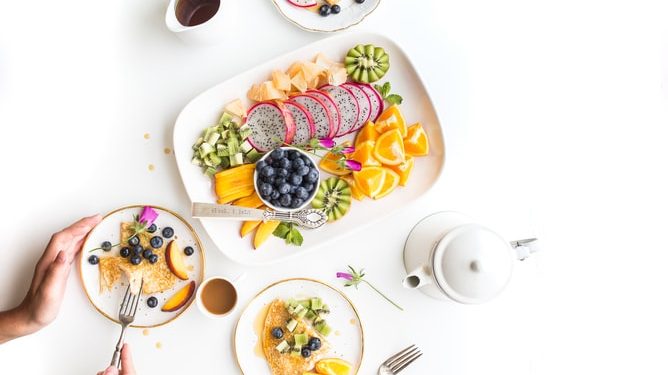Bridget Benelam of the British Nutrition Foundation offers some nutritional advice for Muslims during the holy month of Ramadan, and looks at whether fasting is actually good for your body.
On Monday 12 April, Muslims around the world, including myself, began celebrating the holy month of Ramadan. During the month, many Muslims fast throughout daylight hours, only eating one meal (the ‘suhoor’ or ‘sehri’) just before dawn, and another (the ‘iftar’) after sunset. While enjoying the celebrations, due to the impact of the fast, it is very important that health stays front of mind; my three main pieces of advice are to hydrate, replenish nutrients, and avoid overindulgence.
Hydration, hydration, hydration!
At both suhoor and iftar, hydration is key. Unsurprisingly, water is usually the best option. Juices and smoothies which contain natural sugars can provide some energy as well as hydration, however, to avoid excess sugar consumption it’s best to have these in moderation. Low-fat, water-rich foods, including soup or yoghurt, are also good options for hydrating and fuelling while breaking the fast.
Fresh fruit is a traditional way to break the fast in many South Asian cultures and this is a good, healthy option as fruit provides fibre, natural sugars, fluids and some vitamins and minerals. Dates, which are an integral part of Ramadan, also contain fibre, natural sugars and minerals like potassium, copper and manganese. They are another nutrient-rich, delicious way to start or end the fasting day – you could also try other dried fruits like prunes, raisins or apricots.
Keep your balance
When we are celebrating, and after fasting for a long period, it’s natural to want to treat ourselves with some delicious foods. But, while enjoying this time with your family is important, you should also remember to keep a sense of balance. During non-fasting hours we need to focus on the quality of our diets, eating a balance of foods to keep our bodies healthy. Once the fast has been broken and you have rehydrated, it is time to prioritise the key foods and nutrients that are going to allow you to lead your life healthily and support your efforts throughout the month.
Whole grains, fruit and vegetables, dairy foods and protein-rich foods, like lean meat, fish, eggs and beans, should all form a part of the diet. As a meal idea, you could have a range of fish, meat or pulse-based curries including plenty of vegetables, served with rice, chapattis and yogurt. Although meat is typically found in the cuisines of many Muslim countries, dishes with more plant-based sources of protein, like beans and lentils, add extra fibre and are naturally lower in fat.
At the beginning of the day, as well as prioritising hydration, eating starchy foods and those that are high in fibre, such as oats, wholegrain breads and wholegrain breakfast cereals (ideally lower sugar options), will help provide you with energy for the day. Try to avoid anything too salty, like processed meat, olives and pickles, as these could leave you with a long day of feeling thirsty!
Is fasting good for you?
This time of year often sparks a conversation around the benefits of fasting generally for health and weight loss. When it comes to Ramadan fasting, there are some studies that suggest it may have benefits in terms of weight loss and metabolic health, although we need more research to confirm these. There have also been studies on intermittent fasting as a weight-loss motivated strategy and popular methods include the 5:2 diet, where calories are heavily restricted on two days of the week. Research suggests that this approach can be effective for some people and, although intermittent fasting isn’t superior to other kinds of weight loss diet, it may suit certain individuals who don’t want to restrict their food intake all the time.
Provided you are generally in good health, Ramadan fasting isn’t harmful to health, but it is important that we eat a balance of healthy foods and keep hydrated. It is a time to celebrate with loved ones and, while COVID-19 restrictions mean we cannot enjoy the large celebrations we would in a normal year, we hope everyone has a happy and healthy Ramadan at home or out in your local area.
If you would like more information on eating well during seasonal celebrations like Ramadan, visit the British Nutritional Foundation’s (BNF) website.
Source by www.newfoodmagazine.com















































